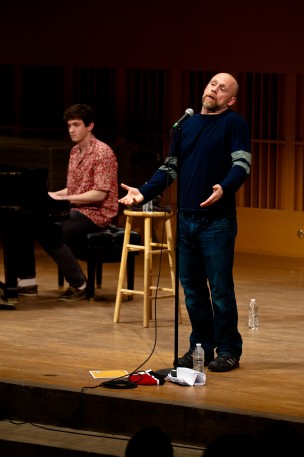As a Wesleyanite and poetry slammer, I was excited all last week by talk of who was coming to Crowell last Thursday. Whether eavesdropping on a conversation in Usdan, talking to non-slamming friends of mine, or learning the what inspired my fellow poets to start writing, all I could hear were two words: BUDDY. WAKEFIELD.
He is known by the title, “two-time Individual World Poetry Slam Champion,” a near-impossible accomplishment that requires extensive writing and performance ability. But host Michael Rosen ’11 provided a different perspective on why this poet is amazing. As he introduced Wakefield’s stellar instrumental accompaniment, cellist-vocalist Mel Hsu ’13 and pianist Simon Riker ’14, Rosen highlighted the fact that Wakefield had performed at the first-ever slam event to take place at Wesleyan. At the time, Rosen had no idea if anyone would come to a poetry slam at Wesleyan on a weekend night, but there was a long line out the door for Wakefield. If it hadn’t been for the popularity of Wakefield’s initial performance, WeSlam may not have ever formed at Wesleyan.
Upon my arrival at Crowell, it became clear that the slam champion still draws a big crowd. And as I watched the performance, I saw why. His performance was unlike anything I was expecting, but in an exciting way. His set was not your standard series of three-minute slam poems with short interludes; in fact, Wakefield only performed four poems during his hour-and-a-half-long performance. Instead, Wakefield spent a large chunk of his time sharing his thoughts on life or telling funny, quirky stories off the top of his head. It seemed that the poetry was woven into his life story.
“The shifts between his poems and his conversations with the audience were imperceptible,” remarked 2013 Group Slam Champion Kara Wernick ’15. “This is a man who speaks the way he writes.”
“Buddy was amazing…He was so real and relaxed, and that vibe permeated the whole space,” said WeSlam team member Lily Myers ’15. Myers also mentioned some of her favorite lines, including “Everything is out there / That’s why they call it everything” and “Stop inviting walls into wide-open spaces.”
In Wakefield’s last and, in my opinion, most powerful poem, he talked about his partner, Steve, to whom he had alluded throughout the night. The poem described their experience of settling down on a farm and Wakefield missing his partner, his home, and even his chickens after four weeks of being on tour. This was Wakefield at his time of greatest vulnerability and beauty, and the poem represented sentiments to which the audience could deeply relate.
There were also moments that provoked hysterical laughter, such as when Buddy began entangling his body in the stool while telling us how he had seen on the Discovery Channel that species that were in danger of becoming overpopulated had started having more homosexual offspring, telling the audience, “You’re welcome.”
“He was quite the character,” said Rachel Verner ’15. “He engaged the audience in some really innovative, mostly humorous ways, and he let himself be vulnerable.”
By the end of the performance, I was completely entranced by Wakefield. Despite everything that was happening in his unique performance and in the pandemonium of his poetry, the audience got a chance to understand who this guy really is: a philosopher, an amazing poet and performer, a wacky character, and a truly great guy.

Comments are closed